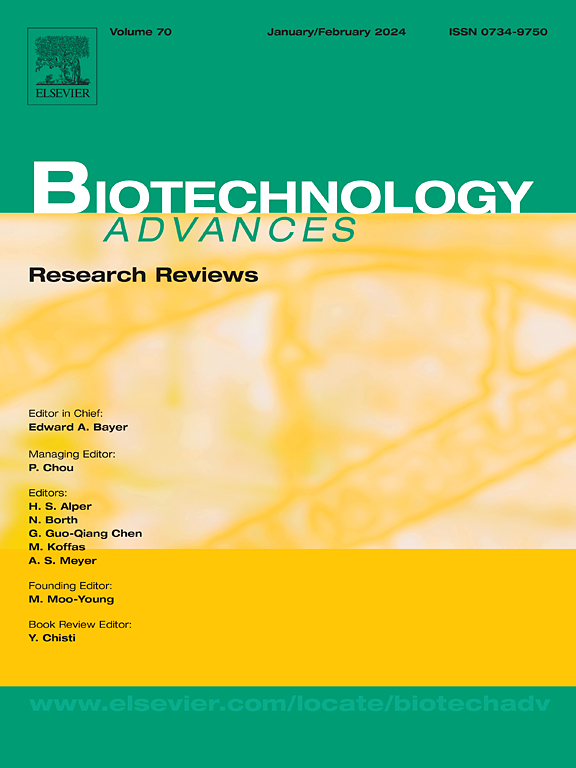Revolutionizing agroindustry: Towards the industrial application of antimicrobial peptides against pathogens and pests
IF 12.1
1区 工程技术
Q1 BIOTECHNOLOGY & APPLIED MICROBIOLOGY
引用次数: 0
Abstract
Antibiotics are essential chemicals for medicine and agritech. However, all antibiotics are small molecules that pathogens evolve antimicrobial resistance (AMR). Alternatively, antimicrobial peptides (AMPs) offer potential to overcome or evade AMR. AMPs provide broad-spectrum activity, favourable biosafety profiles, and a rapid and efficient mechanism of action with low resistance incidence. These properties have driven innovative applications, positioning AMPs as promising contributors to advancements in various industrial sectors. This review evaluates the multifaceted nature of AMPs and their biotechnological applications in underexplored sectors. In the food industry, the application of AMPs helps to suppress the growth of microorganisms, thereby decreasing foodborne illnesses, minimizing food waste, and prolonging the shelf life of products. In animal husbandry and aquaculture, incorporating AMPs into the diet reduces the load of pathogenic microorganisms and enhances growth performance and survival rates. In agriculture, AMPs provide an alternative to decrease the use of chemical pesticides and antibiotics. We also review current methods for obtaining AMPs, including chemical synthesis, recombinant DNA technology, cell-free protein synthesis, and molecular farming, are also reviewed. Finally, we look to the peptide market to assess its status, progress, and transition from the discovery stage to benefits for society and high-quality products. Overall, our review exemplifies the other side of the coin of AMPs and how these molecules provide similar benefits to conventional antibiotics and pesticides in the agritech sector.
农业工业革命:抗病原体和害虫抗菌肽的工业应用
抗生素是医药和农业技术的基本化学品。然而,所有抗生素都是小分子,病原体会产生抗菌素耐药性(AMR)。另外,抗菌肽(AMPs)提供了克服或逃避AMR的潜力。抗菌肽具有广谱活性、良好的生物安全性和快速有效的作用机制,耐药发生率低。这些特性推动了创新应用,使amp成为各个工业领域进步的有前途的贡献者。这篇综述评估了amp的多面性及其在未开发部门的生物技术应用。在食品工业中,抗菌肽的应用有助于抑制微生物的生长,从而减少食源性疾病,最大限度地减少食物浪费,延长产品的保质期。在畜牧业和水产养殖业中,在饲料中添加抗菌肽可减少病原微生物的负荷,提高生长性能和存活率。在农业中,amp提供了一种减少化学农药和抗生素使用的替代方案。综述了目前制备抗菌肽的方法,包括化学合成、重组DNA技术、无细胞蛋白合成和分子农业等。最后,我们将对肽市场进行评估,以评估其现状、进展以及从发现阶段向社会效益和高质量产品的转变。总的来说,我们的综述举例说明了抗菌肽硬币的另一面,以及这些分子如何在农业技术领域提供与传统抗生素和农药相似的益处。
本文章由计算机程序翻译,如有差异,请以英文原文为准。
求助全文
约1分钟内获得全文
求助全文
来源期刊

Biotechnology advances
工程技术-生物工程与应用微生物
CiteScore
25.50
自引率
2.50%
发文量
167
审稿时长
37 days
期刊介绍:
Biotechnology Advances is a comprehensive review journal that covers all aspects of the multidisciplinary field of biotechnology. The journal focuses on biotechnology principles and their applications in various industries, agriculture, medicine, environmental concerns, and regulatory issues. It publishes authoritative articles that highlight current developments and future trends in the field of biotechnology. The journal invites submissions of manuscripts that are relevant and appropriate. It targets a wide audience, including scientists, engineers, students, instructors, researchers, practitioners, managers, governments, and other stakeholders in the field. Additionally, special issues are published based on selected presentations from recent relevant conferences in collaboration with the organizations hosting those conferences.
 求助内容:
求助内容: 应助结果提醒方式:
应助结果提醒方式:


